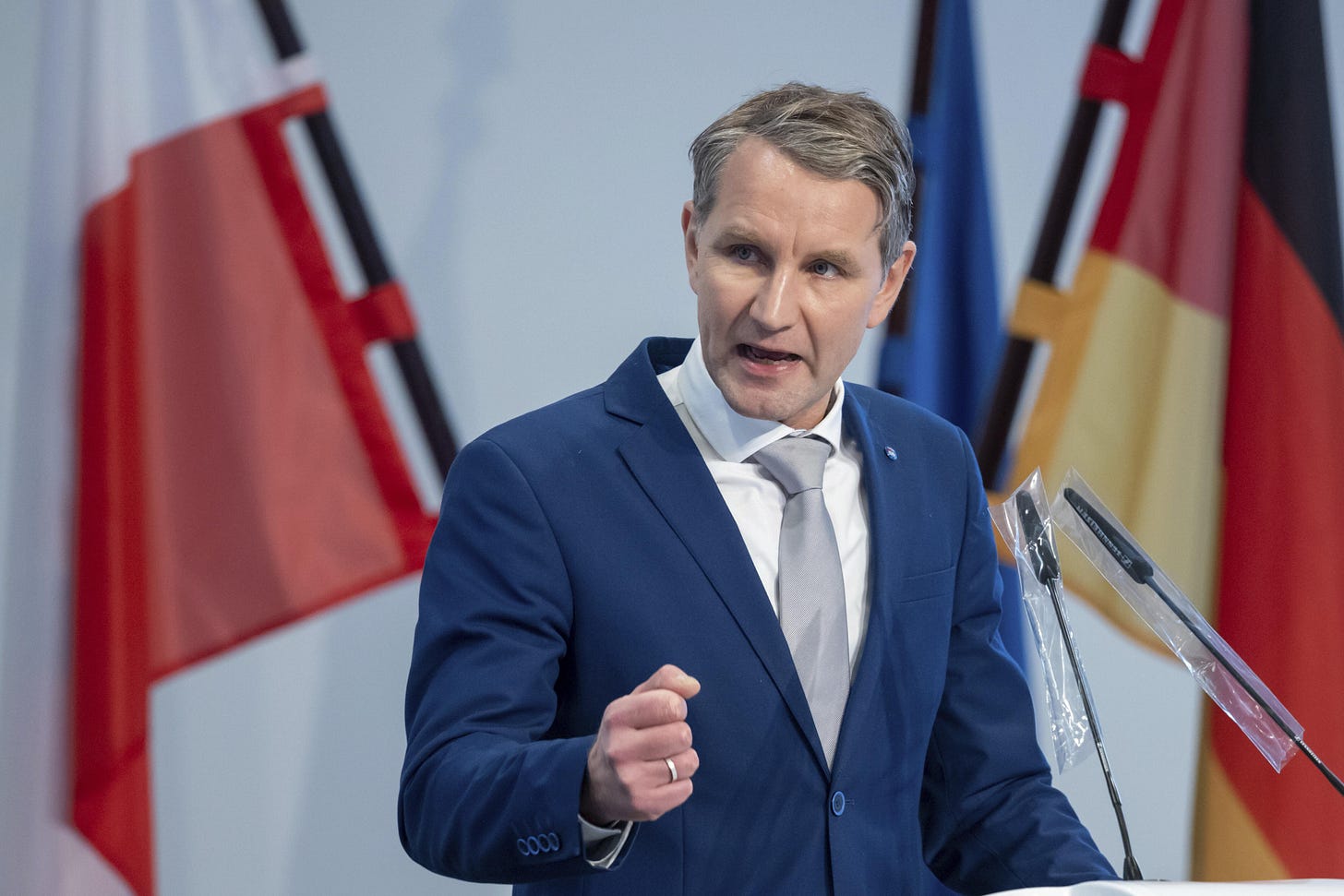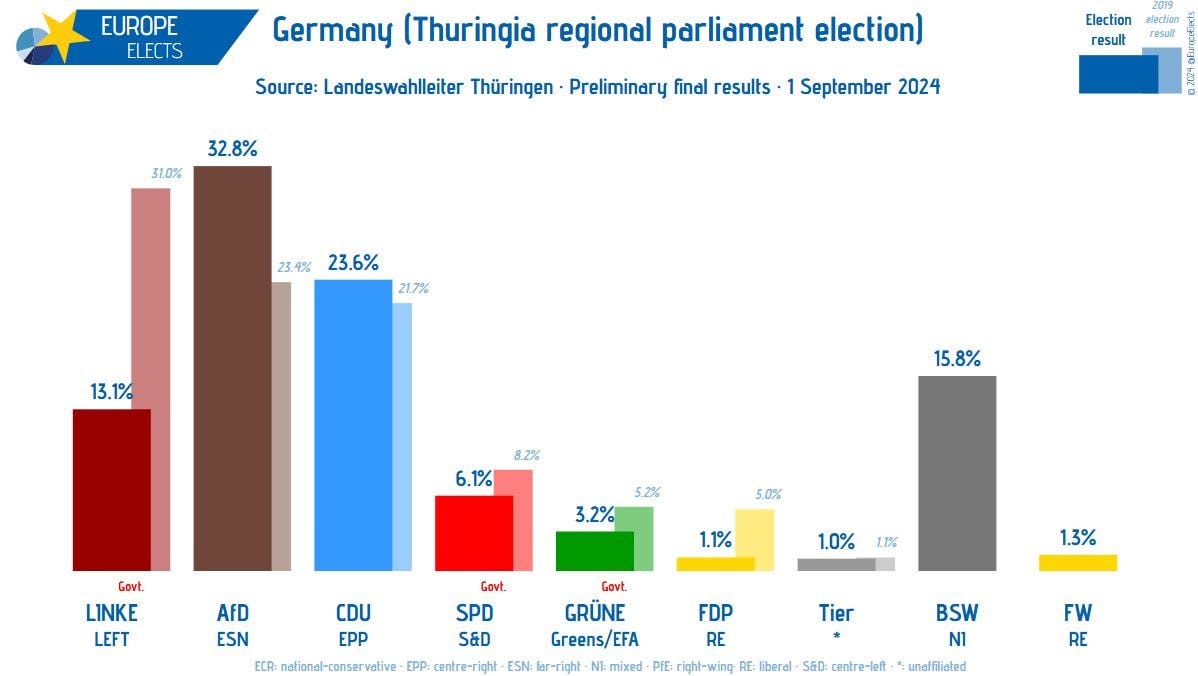Genuine Nationalists Win in German State Elections
The German nation moves to secure its' future
On September 1st, 2024, the German states of Thüringen (Thuringia) and its neighbor to the East Sachsen (Saxony) held state-level legislative elections for the first time since 2019. These elections yielded results that deserve nationalist attention and analysis, not least because Germany is the last nation many nationalists look to for either inspiration or hope. Yet hope is alive and well in Germany and for the German nation.
The Alternative für Deutschland (Alternative for Germany) party, commonly referred to as AfD won significantly in both states, and among Germany’s youth population in the regions, the party won what are essentially majorities. The AfD also took home strong near-majorities with the working class populations of both states and among those working in lower-wage lower-skill professions. In other words, the AfD won amongst those Germans most suffering from the mass importation of ethnically and culturally foreign peoples.
AfD ranges, depending on the part of Germany, from an anti-immigration party similar to Nigel Farage's Reform UK, to a national-conservative party similar to that of Giorgia Meloni’s Brothers of Italy, to an outright ethnic-nationalist party working to preserve, strengthen, and expand the German nation within its homeland. Last night the ethnic-nationalist wing of AfD, led by Björn Höcke, rocketed to victory in Thuringia.
Thuringia:
In Höcke’s home state of Thuringia, where he is also party leader, the AfD secured some 32.84% of the vote and 32 seats in the Thuringian parliament. AfD came out 10 points ahead of the second-place Christian Democratic Union (CDU) and now holds 9 more seats than the CDU. Some readers may recognize the CDU as the party of now-retired Chancellor and mass immigration enabler Angela Merkel.
A new party, the Bündnis Sahra Wagenknecht (BSW), also secured 15.8% of the vote share and 15 seats in Thurginia’s parliament. The BSW is significant because the party presents itself as a non-politically correct left-wing alternative to Germany’s mainstream left-wing parties. The BSW takes hard lines against immigration, foreign adventurism, war with Russia, support for Ukraine, and several other issues that have traditionally been reserved only for the AfD and its supporters.
The two anti-immigration parties in Thuringia secured 48.6% of the vote and 587,152 of the 1,218,190 votes cast by Thuringia’s electorate.
On the opposite side of the political spectrum the left-wing coalition that had been governing Thuringia, composed of the Left, Social Democratic, and Green parties, suffered a significant collapse.
The left party lost 17.9 points and its vote share collapsed from 31% in 2019 to 13.1% in the 2024 election just held. The SPD lost 2.1 points on its 2019 performance and the Green party lost 2 points compared to its 2019 performance.
Another significant development in Thuringia is the robust share of the 18-24 year old vote which the AfD and BSW managed to secure. The AfD garnered some 37% of the 18-24 year old vote while the BSW secured a 12% share. Combined the two anti-immigration parties secured 49% of the vote and when combined with the (barely) right-wing CDU the youth vote in Thuringia voted some 62% in favor of right-wing parties.
Björn Höcke, strengthened by the robust results in the election, immediately came out and proclaimed that the AfD now has a mandate to govern Thuringia, but it is unlikely that he will be able to secure the position of Minister-President. All of the other parties in the state, including the BSW, have made it clear they will not govern alongside or with the tacit support of the AfD.
This is unsurprising considering that the last ‘right-wing’ government of Thuringia, led by Libertarian Thomas Kemmerich with the support of both the AfD and CDU, was quickly crushed by the German federal government, media, and political institutions.
This does not mean that the AfD is powerless, however. With 32 of the 88 seats in Thuringia’s parliament (Landtag) the party may be able to block legislation that requires super-majorities to pass and should be able to regularly use its large share of votes to ensure that its preferred policies are given the most attention in committee settings where it may be able to block the forward progression of bills or vote strategically with the BSW on matters relating to immigration and demographics.
Saxony:
The AfD also came out significantly ahead in the state elections in Saxony, a state that borders Thuringia to the East.
The Saxony AfD increased its vote share from 27.5% in 2019 to 30.6% in the 2024 election, coming in second place. The CDU, who secured the lead in the 2019 election, lost 0.2 points in the 2024 election but suffered the loss of 4 parliamentary seats. Because of this the AfD now holds 40 seats in Saxony’s parliament, only one less than the CDU despite the CDU winning some 30,000 more votes than the AfD.
The BSW, again a new party contesting elections for the first time in Saxony, secured some 11.8% of the vote and more than 277,173 individual votes from the people of Saxony.
Combined the two anti-immigration parties secured 42.4% of the popular vote and 55 of the 120 seats in Saxony’s parliament (Landtag).
A particularly interesting development is that the AfD was originally believed to have won enough seats to hold a vote-blocking minority in Saxony’s parliament, but the state’s electoral commission has since come out and claimed that this was a ‘software error’ and that the AfD holds one less seat than necessary to secure the vote-blocking minority.
While such a development might be believed in another democracy it must be carefully scrutinized within the context of German ‘democracy.’
The Saxony AfD (and the Thuringia AfD for that matter) and its leader, Jörg Urban, have been classified as “anti-constitutional” and a threat to German liberal democracy. Mr. Urban’s AfD has been further classified as a far-right organization and is actively monitored (spied upon) by the Saxony state government’s rather Orwellian “State Office for the Protection of the Constitution.”
More on Björn Höcke:
After laying out all of the statistics and results for the state elections in Thuringia and Saxony it is important to understand the nationalist figure who stands at the center of these developments, Mr. Björn Höcke.
Björn Höcke leads the most right-wing faction of the AfD, known as Der Flügel, a faction of the party that constitutes at least 40% of the party’s membership and has made Höcke the most popular AfD personality in all of Germany.
The members of Der Flügel (which was supposedly dissolved by the AfD, but continues to function internally) are actively monitored by Germany’s federal “Office for the Protection of the Constitution,” which has labeled the wing, its members, and its leaders, as threats to Germany’s liberal democracy and constitutional order.
Mr. Höcke, who has called for Germany to have "not only a thousand-year past", but also "a thousand-year future", takes robust stands in favor of the German nation, and traditional families, and against the general liberalization of German society.
Höcke has spoken at length about how the post-war ‘transatlantic masters’ desire to wipe out distinct peoples, cultures, and genders in order to “take away our human identity.” He has further criticized the admittance of millions upon millions of people from other cultures into Germany and claimed, rather correctly, that it is dividing and destroying the German nation.
He has spoken at length about how the continued absorption of large foreign populations will eventually bring about the social collapse of European societies and how the strengthening of borders is an absolute necessity to prevent this. Mr. Höcke has (rather correctly) accused the German political class of seeking to dissolve the German nation and labeled those undertaking the project as “multicultural extremists” who will destroy Europe through the colorful diversity they bring about through the mass importation of culturally and ethnically foreign peoples.
Björn Höcke has also spoken at length about how modern states, including and especially the German state, seek to abolish the differences between men and women and thereby destroy the family. Höcke has called instead for a politics based on the Prussian virtues of order, duty, punctuality, modesty, honesty, sincerity, restraint, frugality, among others. Within this set of virtues, Höcke imagines a German state which promotes a three-child model of the family centered around life-long heterosexual marriage.
He has further stated that the "polarity of the sexes" should be "cultivated", i.e. in men, "defensiveness, wisdom and leadership" and in women, "intuition, gentleness and devotion".
Conclusion:
The developments in Thuringia and Saxony are significant for the German people and their country. With leaders such as Björn Höcke and a growing base of support, there is a serious opportunity to begin undoing some of the damage the modern elite have visited upon Germany and Europe.
The German people deserve a country of their own again.
White Papers welcomes any financial support so that we may take on additional writers and staff!
Zelle: whitepapersinstitute@protonmail.com
Buy us a coffee: https://www.buymeacoffee.com/wppi
Linktree: https://linktr.ee/wppi
Snail Mail: White Papers Policy, PO Box 192, Hancock, MD 21750









The performance of the BSW seems odd. Who are they, really?